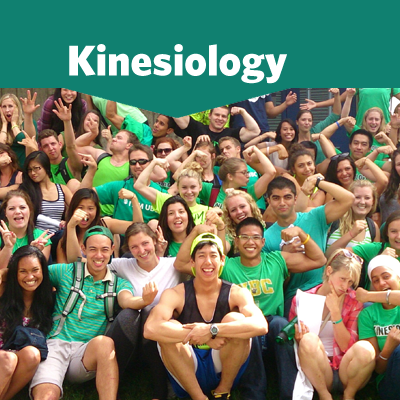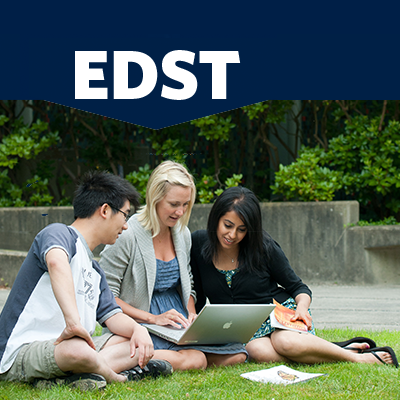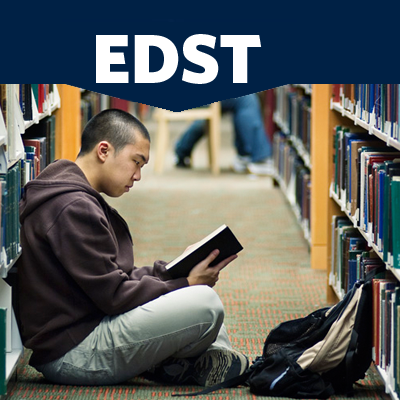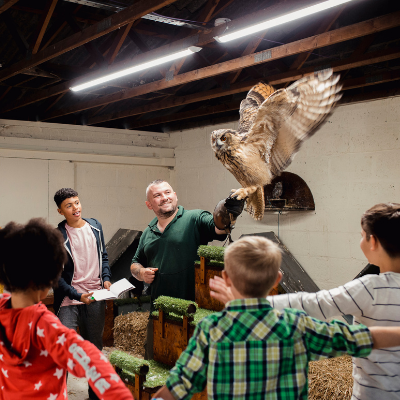
Graduate Certificate & Masters in High Performance Coaching & Technical Leadership (HPC&TL)
The UBC Masters in High Performance Coaching and Technical Leadership is a three year, 30 credit specialized program for experienced sport coaches and technical leaders who are looking to advance in their careers.
The program is composed of a one year graduate certificate followed by masters course work. Year one (June) and two (August) begin with a week long residential institute held at UBC Vancouver. The remaining schedule consists of online teaching methods that are designed to facilitate the participation of candidates from across Canada and around the world.

Master of Arts (MA) – Art Education
Our mission is to inspire, engage and provoke educators to understand, inquire into, and model curricular and pedagogical possibilities of deep involvement with the visual arts in culture and society. Within a large research orientated university situated on traditional Musqueam land, the Art Education Program strives to:
Stimulate and conduct research within a vibrant and collaborative research community that focuses on methodologies and content relevant to the visual arts in culture and society.
Provide for, model, and develop socially responsible and ecologically aware exemplary teaching practices in and across contexts with a focus on the visual arts in culture and society.
Provide leadership, and engage with local, national, and international arts and culture organizations and professionals.
The research interests of faculty in Art Education are diverse. They encourage a wide spectrum of student inquiry: art based research, a/r/tography, art curriculum, early childhood, teacher education, First Nations art and education, histories of art education, multiculturalism, museum and gallery education, perception and cognition, studio practices, technology and visual culture, theory/practice relationships, and gender studies.

Master of Arts (MA) – Business Education
The objective of the Business Education specialization is to provide educational professionals with the knowledge and skills necessary to implement business education programs. Individuals with a degree in Commerce or Business Administration who are not qualified teachers may be considered for admission.

Master of Arts (MA) – Counselling Psychology (Area of Focus: Community & Agency Counselling)
In community and agency counselling, students focus on counselling individuals, couples and families. Affective and developmental needs of individual and families are studied in content and practicum courses. Skills are developed in group and individual counselling. Students graduating from this specialty area are employed as counsellors in a range of governmental, industrial, and agency settings.

Master of Arts (MA) – Counselling Psychology (Area of Focus: Counselling in Higher Education)
In this area of specialization, students focus on college/university counselling. The focus is on the facilitation of informed career decision making and life style planning. Beyond the common core, students in this area acquire knowledge about counselling issues pertinent to students in higher education, and develop skills in individual and group counselling.
Students graduating with this area of focus are employed as counsellors in colleges and universities.

Master of Arts (MA) – Counselling Psychology (Area of Focus: School Counselling)
The MA and MEd programs in school counselling are offered for both elementary and secondary school levels. These programs offered are intended to develop knowledge and skills for school counselling and child and adolescent counselling in non-school settings, with emphasis on individual and group counselling, consultation, coordination and assessment.
Students who complete courses in school counselling are employed by school districts as counsellors. Child and youth counsellors are employed in mental health, hospitals, community care teams, and schools.

Master of Arts (MA) – Curriculum Studies
Curriculum Studies includes, but is not limited to investigations into: teacher education, the social construction or knowledge, curriculum and instructional discourses, and the role of curriculum and curricular reform in K–12 and other learning environments. Students learn about issues of planning and development, program implementation and evaluation, and pre-service teacher education. Inquiry in the field is multidisciplinary and includes numerous perspectives and orientations such as: cultural studies, historical consciousness, post structuralism, feminism, multicultural education, semiotics, and critical theory.

Master of Arts (MA) – Early Childhood Education
Graduate programs in Early Childhood Education are designed for educators and child care professionals who wish to explore issues in early childhood research, theory, and practice. Early childhood graduate programs are interdisciplinary, faculty-wide programs that consist of core courses in early childhood education (ECED) and related courses in other departments. Key areas of focus include: theorizing early childhood and early childhood education, research and research methodologies, issues in early childhood curriculum, instruction, assessment and evaluation, and cross departmental inquiries in early childhood education.

Master of Arts (MA) – Educational Studies
The MA program in Educational Studies is a department-wide program that can be completed full-time over a two-year period or over a longer period for part-time students. The EDST MA is a flexible program designed to meet the needs of a wide range of people interested in conducting and learning about educational research. The emphasis on educational research provides students opportunities and training to conduct their own research projects. MA students can focus their studies in one of four MA concentrations: Adult Learning and Education (ALE); Higher Education (HIED); Society, Culture and Politics in Education (SCPE) or Educational Leadership and Administration (EDAL).

Master of Arts (MA) – Home Economics Education
Graduate studies in Home Economics Education is a small but very lively program. Over the years Home Economics faculty have worked closely in areas of shared interest in research and practice with colleagues throughout the Faculty of Education and related units across campus. Interests include global education, critical inquiry, food, health, environment, and inquiry into practice.
The Department of Curriculum and Pedagogy offers a PhD concentration and MA and MEd specializations in Home Economics Education, along with a secondary Teacher Education (BEd) major and Diploma in Home Economics Education.

Master of Arts (MA) – Human Development, Learning & Culture
The MA program is appropriate for students with an undergraduate degree in an area related to HDLC. The MA program is a 30-credit program that involves completion of coursework and a research-based thesis, and is normally completed over two to three years. The program is appropriate for those with an interest in research and the possibility of continuing on to advanced work in a doctoral program. A teaching certificate is not a requirement.

Master of Arts (MA) – Human Development, Learning & Culture (Concentration: Self-Regulated Learning)
“Self-regulating” learners mobilize “metacognition” (e.g., awareness of strengths and challenges in relation to tasks), motivation/emotions (e.g., growth mindsets), and strategic action to proactively and adaptively learn in all kinds of contexts. Models of self-regulated learning provide powerful frameworks for educators to understand challenges/successes in students’ learning and engagement, and construct practices that foster students’ development as empowered, strategic learners, innovations (e.g., inquiry learning, assessment for learning).
The HDLC MA program is most appropriate for those with an interest in research and the possibility of continuing on to advanced work in a doctoral program. Participants in the MA- SRL concentration will engage in rich, inquiry-based processes through which they will continually have opportunities to co-construct knowledge related to learning and development, and to bridge theory, research and practice. As part of their program, they will advance their understanding about research methods suited to the study of complex learning processes like SRL, and will contribute to understanding about HDLC and SRL through undertaking a supervised masters thesis project.

Master of Arts (MA) – Kinesiology
The School of Kinesiology offers graduate students original investigations (M.A., M.Sc., Ph.D.) in biological, behavioural, and socio-cultural research in Kinesiology. The School also offers a course-based, advanced study program in the Master of Kinesiology (MKin). Students entering the M.A. program are normally expected to have a background in social sciences, while students applying to the M.Sc. program are expected to have a background in the natural or health sciences. Potential MKin students are required to have a B.Kin. or its equivalent.
Are you interested in coaching science? If so, the preferred degree path is the non-thesis MKin degree. Some recent sample major paper titles are: “Exercise Considerations for the Prenatal Client”, “Goal Setting for Collegiate Golf”, and “Injury Prevention in Amateur Ice Hockey”. The faculty member most closely associated with this degree is Dr. Maria Gallo. Information on the program structure is available on our Master’s Program page.

Master of Arts (MA) – Literacy Education
The Masters program in Literacy Education (MEd and MA) engages aspiring professionals in the study of rich language and literacy practices from early childhood through adolescence and adulthood. Masters level courses are offered in the areas of Early and Adolescent Literacy Practices, English Education, Children’s and Adolescent Literature, Drama and Theatre Education, Digital, Multimodal and New Literacies, Adult, Family and Community Literacies, and Teacher-librarianship.

Master of Arts (MA) – Mathematics Education
The graduate programs (MEd & MA) in Mathematics Education are part or the graduate offerings in the Department of Curriculum and Pedagogy. Students can pursue a wide variety of research and professional interests in mathematics teaching and learning. The math education program has a legacy of large-scale research projects, such as the Early Numeracy Project and the Trends in International Mathematics and Science Study (TIMMS), which involve a network of regional, national, and international scholars. For information on research into complexity, please see the Complexity and Education site.

Master of Arts (MA) – Measurement, Evaluation & Research Methods
The Measurement, Evaluation, and Research Methodology (MERM) programs prepare graduate students to be research methodologists, measurement specialists, and evaluators in the public and private sectors.
The MA program prepares graduates for mid-level positions in measurement, testing, research and evaluation. The program is appropriate for those with an interest in research and the possibility of continuing on to advanced work in a doctoral program.

Master of Arts (MA) – Media and Technology Studies Education
Technology Studies Education provides a forum for exploring and studying information and communication technologies (ICT), new media, and the philosophy of technology. Curriculum, pedagogy, research, and development interests of faculty and students include affective computing, cyberculture and cyborg relations, digital ecology and diversity, distributed cognition, gaming, ICT integration in K–16 formal and informal learning environments (face-to-face, hybrid, and online distance education), intellectual property, open source, and cultural studies. The program offers a common core of courses, a range of electives, and a variety of professional education opportunities.

Master of Arts (MA) – Modern Language Education
We offer specialized, individualized and interdisciplinary graduate programs in French immersion, French as a Second or Foreign Language [FSL, FFL], Asia-Pacific and the other modern language education. These programs involve study in second language curriculum, assessment, second language acquisition, bilingualism and intercultural education.
Although there are formal course requirements for the advanced degrees, students in the graduate programs are encouraged, with the aim of individualizing each program of studies, to take graduate courses in the Departments of Anthropology/Sociology, Psychology, and Linguistics in the Faculty of Arts, as well as in the Departments of Educational Studies, Curriculum and Instruction, Administrative Education, and Educational Psychology in the Faculty of Education. In this way, each program is individually tailored to suit students’ talents and interests. The MEd and MA degrees are available on a part- or full-time basis and have no residency requirement.

Master of Arts (MA) – Music Education
Situated spectacularly at the western edge of the culturally vibrant city of Vancouver, the University of British Colombia offers exciting opportunities for graduate study in Music Education.
UBC graduate programs in Music Education are designed to meet a variety of needs and interests, including those of the busy professional teacher, the researcher, the administrator, the curriculum developer, and the future university professor. Specializations include conducting, music pedagogy, early childhood music, curriculum development, cultural studies, music and media studies, music and related technologies, and teacher education.
Music Education faculty members have a wide range of research interests and specialties, using methods that are both qualitative (based in philosophy, history, psychology, sociology, arts-based educational research, and a/r/tography) and quantitative (involving quasi-experimental research, survey research, and large-scale multivariate designs). Courses across the university are also available to our graduate students, and cross-faculty inquiry is actively encouraged.
UBC Music Education graduates have successful careers and have risen to leadership positions in North America, Europe, and Asia.

Master of Arts (MA) – Physical Education
Physical Education offers courses which include integrated/thematic approaches in outdoor environmental, leadership or experimental education programs; active living, health promotion and wellness; movement education; teaching games for understanding; inclusive models of education for equity and justice. Teachers interested in secondary physical education, sports specific instruction, or coaching may enroll in courses within the School of Human Kinetics.

Master of Arts (MA) – School and Applied Child Psychology
The School Psychology program prepares graduate students to become psychologists who work in schools, academic, research, community and private practice settings. The primary goal of the program is to develop professional psychologists whose research, training and practice activities increase the educational and psychological wellbeing of children and youth. The School Psychology program follows a scientist-practitioner model, with emphasis on the integration of theory, research and clinical skills. Training encompasses academic, social, behavioral, consultation, intervention and prevention domains, and students receive training in the integration of assessment and intervention and in relevant professional, legal and ethical issues. Science and professional practice are viewed as interactive and complementary, with research integrated across core psychological and educational foundations training as well as relevant practical experiences at all levels of the program.

Master of Arts (MA) – Science Education
Our graduate programs in Science Education offer students opportunities to pursue a wide range of research and professional interests in the areas of science education, including teacher education, learning and teaching at elementary, secondary, and post-secondary levels and in diverse contexts, such as museums and other institutions and technology-enhanced settings. Current research projects includes the Intergenerational Landed Learning on the Farm project.

Master of Arts (MA) – Social Studies Education
Social Studies prides itself in offering a rich environment with unparalleled opportunities for graduate students desiring a wide range of backgrounds and interests including visual culture, anti-oppressive education, gender studies, historical consciousness, moral education, and the history and politics of curriculum. In addition to the required coursework, a vibrant graduate student community is fostered through speaker series, research centres, seminars, and study groups. Many social studies faculty and students are actively involved in the Centre for the Study of Historical Consciousness and the History Education Network (a seven-year project, sponsored by a $2.1 million SSHRC Strategic Knowledge Clusters Grant awarded in March of 2008).

Master of Arts (MA) – Special Education (Concentration: Autism & Developmental Disabilities)
This concentration is appropriate for students with a special interest in meeting the educational, behavioural, and communication needs of students with autism spectrum disorders or other developmental disabilities (e.g., Down syndrome, cerebral palsy).

Master of Arts (MA) – Special Education (Concentration: Behaviour Disorders)
This concentration is appropriate for students with a special interest in supporting students at risk for or with behavioural disorders.

Master of Arts (MA) – Special Education (Concentration: Blindness & Visual Impairment)
This MA program involves completion of coursework and a research-based thesis, and is normally completed over two years.

Master of Arts (MA) – Special Education (Concentration: Deaf & Hard of Hearing)
This concentration prepares professional personnel to work with all ages of deaf and hard of hearing children and youth in various kinds of educational programs and settings.
The program is offered through a combination of on-campus summer coursework and part-time, on-line study that allows students to remain in their communities and maintain work during the school year.
Master of Arts (MA) – Special Education (Concentration: High Ability)
This concentration prepares professionals in cognitive and social development designed to promote understanding of developmental patterns in learners of high ability.

Master of Arts (MA) – Special Education (Concentration: Learning Disabilities)
This concentration is designed for teachers who work in general education classrooms and/or within learning assistance or resource classrooms that include students with learning disabilities.

Master of Arts (MA) – Special Education (Concentration: Supporting Inclusive Education)
This concentration supports educators and educational leaders who seek to advance their knowledge and expertise related to creating inclusive classrooms and schools.

Master of Arts (MA) – Teaching English as a Second Language TESL
Integrating research and practice, the graduate programs in Teaching English as a Second Language (TESL) offer professional development to teachers of ESL and prepare researchers and leaders in applied linguistics. TESL graduate students gain experience and understanding in such areas as: current issues in TESL theory and practice; second language acquisition, second language reading and writing, language socialization, language and identity, second language assessment, discourse analysis, critical applied linguistics, and research methods.
The TESL/TEFL program accepts well-qualified students from around the globe into a richly international and multicultural academic community.
Master of Education (MEd) – Special Education (Concentration: Blindness & Visual Impairment)
This concentration allows for avenues that prepare educators to work with students who are blind or visually impaired in the classroom and as orientation and mobility specialist.
The program is offered through a combination of on-campus summer coursework and part-time, on-line study that allows students to remain in their communities and maintain work during the school year.

Master of Education (MEd) – Adult Learning & Education
The Adult Learning and Education (ALE) program is a campus-based 30 credit professional degree program for aspiring adult education practitioners who may already be (or wish to be) working as instructors, program planners, consultants, community activists or administrators in a variety of settings. Students learn about ALE history and different philosophical approaches, theories of adult learning, and approaches to program planning and are encouraged to improve their specific area of practice and contribute to public discussions about the significance of adult learning in relation to the economy, social inclusion, community development and cultural diversity.

Master of Education (MEd) – Adult Learning & Global Change
The University of British Columbia, in cooperation with partner universities in South Africa (University of the Western Cape), Sweden (Linköping University), and Australia (Monash University) offers an innovative online, coursework-only Master of Education (MEd) in Adult Learning and Global Change (ALGC).
Students proceed through the two-year, 30-credit program as a cohort drawn from the four participating institutions. Instructors are also drawn from these universities; students will benefit from a truly international staff.

Master of Education (MEd) – Art Education
Our mission is to inspire, engage and provoke educators to understand, inquire into, and model curricular and pedagogical possibilities of deep involvement with the visual arts in culture and society. Within a large research orientated university situated on traditional Musqueam land, the Art Education Program strives to:
Stimulate and conduct research within a vibrant and collaborative research community that focuses on methodologies and content relevant to the visual arts in culture and society.
Provide for, model, and develop socially responsible and ecologically aware exemplary teaching practices in and across contexts with a focus on the visual arts in culture and society.
Provide leadership, and engage with local, national, and international arts and culture organizations and professionals.
The research interests of faculty in Art Education are diverse. They encourage a wide spectrum of student inquiry: art based research, a/r/tography, art curriculum, early childhood, teacher education, First Nations art and education, histories of art education, multiculturalism, museum and gallery education, perception and cognition, studio practices, technology and visual culture, theory/practice relationships, and gender studies. For more information on research in art education, please see the a/r/tography site.
The University of British Columbia Art Education Program ranks in the top eight in North America and is one of two PhD programs in Canada (Concordia is our counterpart).

Master of Education (MEd) – Business Education
The objective of the Business Education specialization is to provide educational professionals with the knowledge and skills necessary to implement business education programs. Individuals with a degree in Commerce or Business Administration who are not qualified teachers may be considered for admission.

Master of Education (MEd) – Counselling Psychology (Area of Focus: Community Counselling Program)
In community and agency counselling, students focus on counselling individuals, couples and families. Affective and developmental needs of individual and families are studied in content and practicum courses. Skills are developed in group and individual counselling. Students graduating from this specialty area are employed as counsellors in a range of governmental, industrial, and agency settings.

Master of Education (MEd) – Counselling Psychology (Area of Focus: Counselling in Higher Education)
In this area of specialization, students focus on college/university counselling. The focus is on the facilitation of informed career decision making and life style planning. Beyond the common core, students in this area acquire knowledge about counselling issues pertinent to students in higher education, and develop skills in individual and group counselling.
Students graduating with this area of focus are employed as counsellors in colleges and universities.

Master of Education (MEd) – Counselling Psychology (Area of Focus: School Counselling)
Both the MA and MEd programs contain a substantive common core of courses in counselling theory and skill acquisition. In addition to basic counselling theory, important aspects of the core include counselling skill development under direct faculty supervision in one of the Department’s school or community-based training centres, development of appropriate assessment skills using standardized and non-standardized measures, and further development of counselling skills in a final practicum most often based within a school or community agency setting.

Master of Education (MEd) – Curriculum & Leadership
This is a collaborative program between the Educational Administration and Leadership Program and the Department of Curriculum and Pedagogy. The Program was created in response to increasing interest in the study of a combination of curricular leadership on the one hand, and organizational leadership in schools on the other. The applicants for this collaborative program will be teachers in K–12 education who wish to increase their level of understanding and skill in both areas. Upon completion of the program, the students will assume positions of formal or informal leadership in schools, making important contributions to the education of children.

Master of Education (MEd) – Curriculum and Leadership
This is a collaborative program involving two departments: the Department of Educational Studies and the Department of Curriculum and Pedagogy. The Program was created in response to increasing interest in the study of a combination of curricular leadership on the one hand, and organizational leadership in schools on the other. The applicants for this collaborative program will be teachers in K–12 education who wish to increase their level of understanding and skill in both areas. Upon completion of the program, the students will assume positions of formal or informal leadership in schools, making important contributions to the education of children.

Master of Education (MEd) – Curriculum Studies
Curriculum Studies includes, but is not limited to investigations into: teacher education, the social construction or knowledge, curriculum and instructional discourses, and the role of curriculum and curricular reform in K–12 and other learning environments. Students learn about issues of planning and development, program implementation and evaluation, and pre-service teacher education. Inquiry in the field is multidisciplinary and includes numerous perspectives and orientations such as: cultural studies, historical consciousness, post structuralism, feminism, multicultural education, semiotics, and critical theory.

Master of Education (MEd) – Early Childhood Education
Graduate programs in Early Childhood Education are designed for educators and child care professionals who wish to explore issues in early childhood research, theory, and practice. Early childhood graduate programs are interdisciplinary, faculty-wide programs that consist of core courses in early childhood education (ECED) and related courses in other departments. Key areas of focus include: theorizing early childhood and early childhood education, research and research methodologies, issues in early childhood curriculum, instruction, assessment and evaluation, and cross departmental inquiries in early childhood education.

Master of Education (MEd) – Early Childhood Education Online Cohort
The MEd program in Early Childhood Education (ECED) is designed for teachers, early childhood educators, and other early childhood education professionals who are interested in enhancing their knowledge of professional practice with young children.
This engaging, online graduate degree program allows you to inquire into your work with young children, and offers opportunities to explore issues in early childhood research, theory, and practice.

Master of Education (MEd) – Educational Administration & Leadership
The Educational Administration and Leadership Program (EDAL) is a graduate program of interest to persons who seek to exercise leadership in a wide array of formal and informal educational settings. Graduates will be prepared to provide leadership as educators, administrators and facilitators of educational change within schools and communities.
The EDAL Program is known for its ability to generate student professional growth. It challenges established assumptions and offers critical perspectives on education and society. The Program has a distinctive Canadian content and engages with a wide array of educational initiatives across British Columbia and Canada.

Master of Education (MEd) – Higher Education
The Higher Education Program at UBC focuses on the study of all facets of institutions of higher learning. The multifaceted, interdisciplinary Program draws on aspects of history, philosophy, sociology, economics, political science, psychology, sociology, law, and administrative studies.

Master of Education (MEd) – Home Economics Education
Graduate studies in Home Economics Education is a small but very lively program. Over the years Home Economics faculty have worked closely in areas of shared interest in research and practice with colleagues throughout the Faculty of Education and related units across campus. Interests include global education, critical inquiry, food, health, environment, and inquiry into practice.
The Department of Curriculum and Pedagogy offers a PhD concentration and MA and MEd specializations in Home Economics Education, along with a secondary Teacher Education (BEd) major and Diploma in Home Economics Education.

Master of Education (MEd) – Human Development, Learning & Culture
The MEd program is appropriate for students with an undergraduate degree in an area related to HDLC. The MEd program is a course-based 30-credit program that is normally completed over two years. It is usually a terminal degree appropriate for those with an interest in advancing their knowledge in the area of HDLC, but who are not interested in conducting research. A teaching certificate is not a requirement.

Master of Education (MEd) – Human Development, Learning & Culture (Concentration: Self-Regulated Learning)
“Self-regulating” learners mobilize “metacognition” (e.g., awareness of strengths and challenges in relation to tasks), motivation/emotions (e.g., growth mindsets), and strategic action to proactively and adaptively learn in all kinds of contexts. Models of self-regulated learning provide powerful frameworks for educators to understand challenges/successes in students’ learning and engagement, and construct practices that foster students’ development as empowered, strategic learners. In today’s classrooms, promoting SRL supports 21st century learning and other educational innovations (e.g., inquiry learning, assessment for learning).
Participants in the MEd SRL concentration will engage in rich, inquiry-based processes through which they will continually have opportunities to co-construct knowledge related to learning and development, and to bridge theory, research and practice. Using an inquiry-based approach, educators will learn about the dimensions of self-regulation (e.g., cognitive, motivational, social-emotional, behavioural), and be prepared to create inclusive, SRL-promoting environments in the contexts where they are working.

Master of Education (MEd) – Mathematics Education
The graduate programs (MEd & MA) in Mathematics Education are part or the graduate offerings in the Department of Curriculum and Pedagogy. Students can pursue a wide variety of research and professional interests in mathematics teaching and learning. The math education program has a legacy of large-scale research projects, such as the Early Numeracy Project and the Trends in International Mathematics and Science Study (TIMMS), which involve a network of regional, national, and international scholars.

Master of Education (MEd) – Measurement, Evaluation & Research Methods
The Measurement, Evaluation, and Research Methodology (MERM) programs prepare graduate students to be research methodologists, measurement specialists, and evaluators in the public and private sectors.
The MEd program is usually a terminal degree appropriate for those with an interest in the application of measurement, evaluation and research to specific educational, health and social service contexts.

Master of Education (MEd) – Media and Technology Studies Education
Technology Studies Education provides a forum for exploring and studying information and communication technologies (ICT), new media, and the philosophy of technology. Curriculum, pedagogy, research, and development interests of faculty and students include affective computing, cyberculture and cyborg relations, digital ecology and diversity, distributed cognition, gaming, ICT integration in K–16 formal and informal learning environments (face-to-face, hybrid, and online distance education), intellectual property, open source, and cultural studies. The program offers a common core of courses, a range of electives, and a variety of professional education opportunities.

Master of Education (MEd) – Modern Language Education
This Master’s program consists of 30 course credits and is taught entirely in French, with the exception of certain readings in English (papers may be written in English). Participants must therefore be comfortable with written and spoken French. Each year of the two-year program begins with a three-week course in Montreal in July. During the remainder of the year, three courses will be taught from September to June. Students attend these courses online via teleconferencing. Action research on learning a second language or on a theme related to French as a second language forms the core of this program. Accordingly, the program will include courses in research methods as well as courses related to bilingualism and the acquisition and teaching of a second language. In addition, students will investigate a specific topic relevant to their own classrooms.

Master of Education (MEd) – Music Education
Situated spectacularly at the western edge of the culturally vibrant city of Vancouver, the University of British Colombia offers exciting opportunities for graduate study in Music Education.
UBC graduate programs in Music Education are designed to meet a variety of needs and interests, including those of the busy professional teacher, the researcher, the administrator, the curriculum developer, and the future university professor. Specializations include conducting, music pedagogy, early childhood music, curriculum development, cultural studies, music and media studies, music and related technologies, and teacher education.
Music Education faculty members have a wide range of research interests and specialties, using methods that are both qualitative (based in philosophy, history, psychology, sociology, arts-based educational research, and a/r/tography) and quantitative (involving quasi-experimental research, survey research, and large-scale multivariate designs). Courses across the university are also available to our graduate students, and cross-faculty inquiry is actively encouraged.
UBC Music Education graduates have successful careers and have risen to leadership positions in North America, Europe, and Asia.

Master of Education (MEd) – Physical Education
This master’s program is offered to physical educators who are ready to move up a gear by refining and expanding their ideas of teaching, learning and knowing. Using Teaching Games for Understanding (TGfU) as a catalyst for thinking about ontological and epistemological issues in physical education, teachers will start to explore constructivist, student-centered and holistic approaches as possibilities for their own practice.
They will also examine their position on continuums of belief from inclusion to elitism, transaction to transmission, integration to dualism, tactical understanding to skill acquisition, discovery to representation, concepts to techniques and finally between demonstration and creation of understanding rather than mastery.
It has long been argued that research by teachers about their own classroom and school practices functions as a powerful mechanism for professional change, as it generates new ways of thinking about practice. The first cohort (2009-2011) focused on TGfU research and published an edited book titled ‘Reconceptualizing PE through TGfU’ (2012) made up of condensed versions of their final graduating projects.
This has started a change that should generate health and sustainable programs of teacher research, distributed across schools, teacher groups, school-university partnerships and regional and national forums. This master’s program focusing on physical education is advertising the third cohort to begin in June 2014.
Our internationally known program instructors have built upon the practical ideas, shared research, and reflections that presenters brought to the 2008 International TGfU Conference at UBC. Courses and texts will examine current teaching perspectives, constructs of ability, and curriculums, move into analyzing TGfU from pedagogical and learning theory perspectives, and finally, consider, define, and implement developmentally appropriate TGfU activities.

Master of Education (MEd) – School and Applied Child Psychology
The School Psychology program prepares graduate students to become psychologists who work in schools, academic, research, community and private practice settings. The primary goal of the program is to develop professional psychologists whose research, training and practice activities increase the educational and psychological wellbeing of children and youth. The School Psychology program follows a scientist-practitioner model, with emphasis on the integration of theory, research and clinical skills. Training encompasses academic, social, behavioral, consultation, intervention and prevention domains, and students receive training in the integration of assessment and intervention and in relevant professional, legal and ethical issues. Science and professional practice are viewed as interactive and complementary, with research integrated across core psychological and educational foundations training as well as relevant practical experiences at all levels of the program.

Master of Education (MEd) – Science Education
Our graduate programs in Science Education offer students opportunities to pursue a wide range of research and professional interests in the areas of science education, including teacher education, learning and teaching at elementary, secondary, and post-secondary levels and in diverse contexts, such as museums and other institutions and technology-enhanced settings. Current research projects includes the Intergenerational Landed Learning on the Farm project.

Master of Education (MEd) – Social Studies Education
Social Studies prides itself in offering a rich environment with unparalleled opportunities for graduate students desiring a wide range of backgrounds and interests including visual culture, anti-oppressive education, gender studies, historical consciousness, moral education, and the history and politics of curriculum. In addition to the required coursework, a vibrant graduate student community is fostered through speaker series, research centres, seminars, and study groups. Many social studies faculty and students are actively involved in the Centre for the Study of Historical Consciousness and the History Education Network (a seven-year project, sponsored by a $2.1 million SSHRC Strategic Knowledge Clusters Grant awarded in March of 2008).

Master of Education (MEd) – Society, Culture & Politics in Education
The MA degree concentration in Society, Culture and Politics in Education (SCPE) seeks to address the historical, social, political, philosophical, and cultural aspects of education. We define education very broadly to include formal school contexts, as well as non-formal education and informal learning at all levels and life stages. The SCPE concentration examines the meaning and outcomes of critical theories of education, policies, and practices for public life in Canada and across the world. As scholars working within and across many disciplines, we view education as a central field within the arts, social sciences, and humanities.
Students and faculty associated with the SCPE concentration share interests in the part played by education in developing socially, ecologically, politically and culturally just societies.

Master of Education (MEd) – Special Education (Concentration: Autism & Developmental Disabilities)
This concentration is appropriate for students with a special interest in meeting the educational, behavioural, and communication needs of students with autism spectrum disorders or other developmental disabilities (e.g., Down syndrome, cerebral palsy).
Master of Education (MEd) – Special Education (Concentration: Behaviour Disorders)
This concentration is appropriate for students with a special interest in supporting students at risk for or with behavioural disorders.

Master of Education (MEd) – Special Education (Concentration: Deaf & Hard of Hearing)
This concentration prepares professional personnel to work with all ages of deaf and hard of hearing children and youth in various kinds of educational programs and settings.
The program is offered through a combination of on-campus summer coursework and part-time, on-line study that allows students to remain in their communities and maintain work during the school year.

Master of Education (MEd) – Special Education (Concentration: High Ability)
This concentration prepares professionals in cognitive and social development designed to promote understanding of developmental patterns in learners of high ability.

Master of Education (MEd) – Special Education (Concentration: Learning Disabilities)
The concentration is designed for teachers who work in general education classrooms and/or within learning assistance or resource classrooms that include students with learning disabilities.

Master of Education (MEd) – Special Education (Concentration: Supporting Inclusive Education)
This concentration will support educators and educational leaders who seek to advance their knowledge and expertise related to creating inclusive classrooms and schools. Using an inquiry-based approach, the program will bring together classroom teachers and special educators to consider how they can work collaboratively to support the diverse learning needs of students in inclusive settings. It will also prepare educators, administrators, policy-makers and/or other related professionals who wish to serve as leaders in designing and supporting inclusive practices in classrooms, schools, and larger educational systems.

Master of Education (MEd) – Teaching English as a Second Language TESL
Integrating research and practice, the graduate programs in Teaching English as a Second Language (TESL) offer professional development to teachers of ESL and prepare researchers and leaders in applied linguistics. TESL graduate students gain experience and understanding in such areas as: current issues in TESL theory and practice; second language acquisition, second language reading and writing, language socialization, language and identity, second language assessment, discourse analysis, critical applied linguistics, and research methods.
The TESL/TEFL program accepts well-qualified students from around the globe into a richly international and multicultural academic community.

Master of Education (MEd) – Ts’‘Kel Program
Ts’‘kel, which means golden eagle in the Hal’qemeylem language, was originally established in 1984 as a program of study leading to a Master of Education in Administration. Ts’‘kel students are engaged in interdisciplinary research on social and educational topics related to schooling, Aboriginal community development, and historical and theoretical work that has a direct relationship to First Nations health and welfare.
Ts’‘kel is an integrated program for advancing Aboriginal access and Indigenous content in education and across disciplines throughout UBC. Students do not apply to Ts’‘kel, but to the department and a graduate program of their choice.

Master of Education (MEd) – Vocational Rehabilitation Counselling
The Vocational Rehabilitation Counselling (VRHC) is to address the vocational effects of neurological, physical, sensory, psychiatric, neuropsychological and pain-related disabilities. The curriculum has been developed in accordance with future program accreditation requirements and prepares graduates for licensing by respective professional licensing bodies for vocational rehabilitation professionals.The area of focus in Vocational Rehabilitation Counselling which follows the scientist-practitioner training model and prepares students for independent practice in a wide spectrum of vocational rehabilitation service areas, including, but not limited to: vocational assessment, vocational individual and group intervention, adjustment and rehabilitative counselling, job development and placement, return-to-work planning, case and disability management, and research and program evaluation. A supervised clinical experience in the Vocational Rehabilitation setting, as well as coursework on psychosocial and medical aspects of disability, has also been built into the curriculum. It is responsive to the needs of Canadian vocational rehabilitation professionals and provides a uniquely Canadian perspective on vocational rehabilitation counselling and the environment where it is delivered.Both regular UBC faculty and sessional faculty will be involved in teaching. Sessional faculty will be selected among expert vocational rehabilitation professionals with academic background and qualifications.

Master of Education (MEd) – Curriculum Studies | Health, Outdoor, & Physical Experiential Education In-Person Cohort
This cohort will be of interest to health, outdoor and physical educators who work in schools and other sites of learning, including health promotion agencies, community health services, and environmental and recreational organizations.
This MEd cohort is timely, as many educators and professionals move away from instrumental hierarchical approaches in order to engage students and communities in participatory cultures.

Master of Education (MEd) – Curriculum Studies | Kootenays Blended Cohort
This unique MEd in Curriculum Studies, with a focus on Practitioner Inquiry and Place-Conscious Pedagogies, takes into account a diversity of perspectives, pedagogies, and conceptions of curriculum. This part-time graduate cohort takes place in Nelson, BC in a blended format (online September – June with in-person summer courses).
This program offers students opportunities to examine, theoretically and experientially, the multiple and complex relations between teaching, learning, place, and the potential realization of social justice in local contexts.

Master of Education (MEd) – Educational Administration & Leadership In-Person Cohort
Leadership Through an Inquiry Lens: Building Inclusive Communities
The Surrey School District is excited to host this cohort, the theme of which – Leadership through an Inquiry Lens: Building Inclusive Communities – fits with the district’s vision and priority practices.
Students in this cohort will have an opportunity to reflect and build upon inquiry-focused school planning for the purpose of developing inclusive communities that contribute to the social and emotional learning and wellbeing of students. The program will emphasize the school’s role in fostering inclusion for all students, with an emphasis on reconciliation with, and success for, members of Indigenous communities.

Master of Education (MEd) – Home Economics Education Online Cohort
This online graduate program delves into key aspects of Home Economics curriculum with connections to Applied Design, Skills, and Technologies (ADST) curriculum, Textile Arts, and Culinary Arts.
This program has been designed for school and community educators who teach in areas such as food and nutrition, textiles, family studies, health, human ecology, consumer studies or related projects such as food security or school gardens.

Master of Education (MEd) – Literacy Education Online Cohort
This online graduate program allows students to read and engage with the latest research in the field of Literacy education, and connect research to practice.
This program aims to personalize the learning for each admitted cohort. Depending on each cohort’s learning needs, adjustments will be made in the delivery of courses. Students will be encouraged from the beginning of the program to engage in self inquiry by bringing their personal questions into synchronous and asynchronous conversations, and exploring the answers to these questions through their course assignments and graduating project.

Master of Education (MEd) – Mathematics Education Online Cohort
This MEd is a unique, fully-online program exploring approaches for constructing and living mathematics curriculum responsive to place/land and connected to community.
The program offers opportunities to study teaching and learning mathematics in diverse community contexts, and applications are welcome from a wide range of students including early childhood educators, elementary school teachers, secondary and post-secondary school teachers, and educators keen to explore creative and innovative contexts to support and inspire children and youth in mathematical inquiry in community.

Master of Education (MEd) – Media & Technology Studies Education Online Cohort
Explore the field of applied design and its relationship to learning technology in education
This masters program is ideal for teachers specializing in computer science, ICT, and technology education, as well as more generally teachers within the Applied Design, Skills, and Technologies (ADST) cluster in BC schools.
Applied learning has become an integral part of all of British Columbia’s curricula. Through the newly designed Applied Design, Skills, and Technologies (ADST) curriculum students are offered several options to develop the ability to design, make, acquire, and apply skills and technologies key for their engagement as citizens of the future.

Master of Education (MEd) – Modern Languages: French Online Cohort
For teachers in French Immersion, Francophone, Core French and Intensive French Programs.
This graduate program allows teachers to explore their classroom practices from a research-informed perspective by placing the focus on their specific interests related to French language teaching, for example: multiliteracies and translanguaging, intercultural learning and curriculum renewal through indigenization, using gaming to teach French, social justice and inclusive practices in French language programs, as well as other current issues.

Master of Education (MEd) – Science Education Online Cohort
A part-time fully online graduate program offered by leading UBC Science Education researchers to working professionals in Canada and beyond.
The MEd in Science Education is ideal for those seeking to make a difference in teacher education; learning and teaching at the elementary, secondary and post-secondary levels; industry; teaching and research institutions; government and private sector bodies; museums; outdoor settings and other science-based organizations.

Master of Education (MEd) – Social Studies Education Online Cohort
Curriculum, Historical inquiry, & Pedagogy (CHiP)
This program delves into key aspects of social studies curricula with connections to historical thinking, historical consciousness, visual culture, anti-oppressive and anti-racism education, gender studies, moral education, and the history and politics of curriculum.
As educators in diverse contexts, the students in this program are responsible for being and creating active citizens who work for the betterment of humanity. Issues of equity, diversity, and social justice are central to the ChiP cohort and serve as foundational lenses for interrogating social studies curriculum and pedagogy.

Master of Education (MEd) – Teaching English as a Second Language Online Cohort
The goal of this online graduate program is to develop specialized professionals in the field of Teaching English as a Second Language (TESL).
The Master of Education in Teaching English as a Second Language is a graduate-level, part-time and online cohort program that allows students to gain theoretical and practical knowledge in areas such as applied linguistics for teachers; second and foreign language acquisition; English proficiency assessment; language, discourse, and identity; multilingual literacy and multimodality, and more!

Master of Education in Indigenous Education – Online Cohort
A focus on Indigenous education policy, curriculum, and community relationships.
A program that will equip educators to respond to Indigenous Education initiatives across the province of British Columbia.

Master of Educational Technology (MET)
This multidisciplinary program, offered by the Faculty of Education, is a collaboration among multiple departments. Learn more about Faculty-wide graduate programs administered by the Office of Graduate Programs and Research (OGPR).
Skilled Educators create rich learning environments where students are introduced to new ideas, develop new skills, and expand their perspectives. The informed use of technology can engage students in new experiences and create a community of learners across geographical boundaries.
The UBC Master of Educational Technology (MET) is a fully online graduate-level program offered by a world-renowned university, that has attracted students from over 35 countries. A truly international program.

Master of Kinesiology (MKin)
The School of Kinesiology offers graduate students original investigations (M.A., M.Sc., Ph.D.) in biological, behavioural, and socio-cultural research in Kinesiology. The School also offers a course-based, advanced study program in the Master of Kinesiology (MKin). Students entering the M.A. program are normally expected to have a background in social sciences, while students applying to the M.Sc. program are expected to have a background in the natural or health sciences. Potential MKin students are required to have a B.Kin. or its equivalent.
Are you interested in coaching science? If so, the preferred degree path is the non-thesis MKin degree. Some recent sample major paper titles are: “Exercise Considerations for the Prenatal Client”, “Goal Setting for Collegiate Golf”, and “Injury Prevention in Amateur Ice Hockey”. The faculty member most closely associated with this degree is Dr. Maria Gallo. Information on the program structure is available on our Master’s Program page.

Master of Museum Education (MMEd)
The Master of Museum Education is a unique graduate degree program focusing on the study of education and learning that occurs in museums and other informal learning contexts. This programs draws together Museum professionals, educators and those with an interest in using the community to support teaching and learning to further their thinking and scholarship around museums as sites of education and learning.
As museums contemplate new roles within society it will be incumbent upon museum professionals, and particularly museum educators, to become catalysts for different ways of thinking about the educational roles and potentials of museums and other informal learning sites, teaching and learning in museum settings as well as exploring new relationships between museums and the broader community.
This program will provide the necessary skills and knowledge for careers as educators in informal settings such as museums, locally and globally, and to support classroom-based teachers in expanding their use of the community as a learning site. The program model is one that recognizes the need for contextualizing museum education curriculum in both home country context (which has its own unique social and political context) and in the Canadian cultural context of museum education, in which practices may be conceptualized in other beneficial ways to that of the student’s own country of origin. The end result are graduating students that are then better able to influence the systems in their own countries with strengthened capacities to introduce beneficial reforms around museum education.

Master of Museum Education (MMEd) – Online Cohort
The MMEd is a unique graduate degree program focusing on the study of education and learning that occurs in museums and other informal learning contexts (such as, art galleries, science centres, parks and historic sites).
This program draws together Museum professionals, educators and those with an interest in using the community to support teaching and learning to further their thinking and scholarship around museums as sites of education and learning.

Master of Science (MSc) – Kinesiology
The School of Kinesiology offers graduate students original investigations (M.A., M.Sc., Ph.D.) in biological, behavioural, and socio-cultural research in Kinesiology. The School also offers a course-based, advanced study program in the Master of Kinesiology (MKin). Students entering the M.A. program are normally expected to have a background in social sciences, while students applying to the M.Sc. program are expected to have a background in the natural or health sciences. Potential MKin students are required to have a B.Kin. or its equivalent.
Are you interested in coaching science? If so, the preferred degree path is the non-thesis MKin degree. Some recent sample major paper titles are: “Exercise Considerations for the Prenatal Client”, “Goal Setting for Collegiate Golf”, and “Injury Prevention in Amateur Ice Hockey”. The faculty member most closely associated with this degree is Dr. Maria Gallo. Information on the program structure is available on our Master’s Program page.